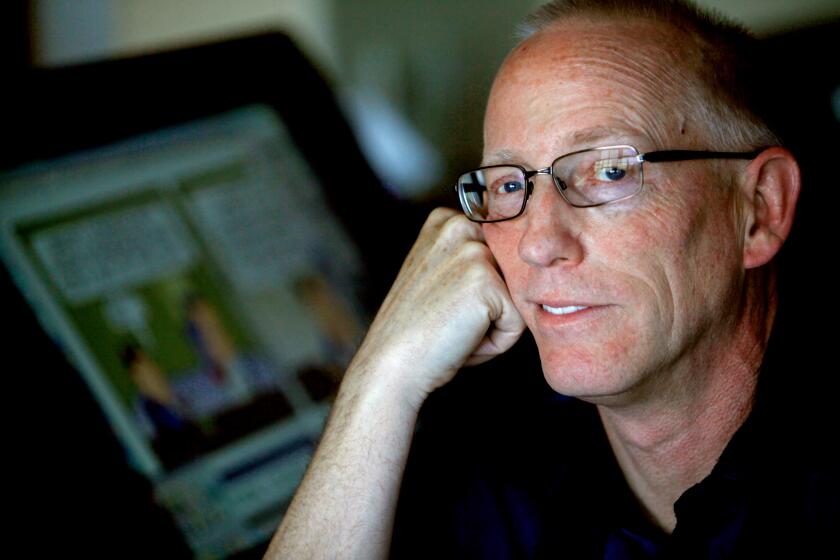David Foster Wallace mourned at Pomona College
- Share via
“Tell me a story about how things will get better,” David Foster Wallace asked his friend Jonathan Franzen last summer. It was a particularly dark summer for Wallace, mired in a depression that ended, on Sept. 12, in suicide.
Franzen spoke Saturday at a simple memorial service at Bridges Hall on the campus of Pomona College, where in 2002 Wallace was named the first Roy E. Disney endowed professor of creative writing and professor of English.
“He was in a terrible and dangerous place as a man and a writer,” Franzen told the writer’s friends and family, colleagues and students. “I said I thought his best writing was ahead of him. He said, ‘Tell me another one.’ ”
Wallace had stopped picking up the phone, Franzen said, his voice cracking, and entered a “well of infinite sadness.”
It was a dark, blustery Saturday in Southern California. The 200 or so people assembled for the service included Wallace’s wife, Karen, his sister, Amy, and his parents.
There were many beautiful, serious, sorrowful young people. A large bouquet of sunflowers in front of the speaker’s podium looked oddly garish. The silence in the room was broken periodically by a muffled snuffling. People leaned against each other.
Michael Pietsch, Wallace’s editor at Little, Brown, spoke next: “Working with David was a thrill and an honor,” he said.
Pietsch talked about the joys and challenges of editing Wallace’s books, including his acknowledged masterpiece, the novel “Infinite Jest.”
Wallace, he said, “preferred notes in tiny fonts with no margin above all other kinds of communication. I think he wanted to use every word in the English language.”
Pietsch also mentioned Wallace’s discomfort with public attention. “People who see me as a golden boy,” he recalled the author saying, “make me feel lonely and alone.”
This may be the most difficult part of the Wallace story, a contradiction that is almost impossible to resolve. Wallace was revered by many for his empathy and thoughtfulness, for his thank-you notes to those who worked on his books and his generous, lengthy comments on student papers.
“People who read him expected to be intimidated by him in person,” Pietsch said. He paused briefly, waving his hands across the podium, as if to say, “I can do this, just give me a minute.”
Then, he continued: “His great act of kindness to me was to allow me to bring his books into the world.”
Throughout the service, the room remained remarkably still; four high windows drew a soft light down onto the stage, where a single cellist played.
Wallace’s students remembered the smiley faces he drew in the margins of their papers. Many commented on how deeply he saw and felt the world and what a remarkably accessible teacher he was.
One student, Amanda Shapiro, took Wallace’s creative writing seminar last spring. “He never made us read our work out loud,” she said. “Dave would never have made me do this.”
She spoke of his sense of obligation to his readers: “Remember to write with compassion,” he told students. “You can be demanding with your readers, but you have to be kind to them too.”
“He had a shy sweetness,” Shapiro said, “and an ability to untangle our half-formed thoughts. He was the most consistently prepared and rigorous teacher I’ve ever had. You’d go to see him and leave feeling like he had built a suit of armor around you.”
All of the speakers remembered Wallace’s integrity and commitment to the craft of writing, as well as his desire to be sincere, real and understood.
Workshops with Wallace, according to his students, began with the general acknowledgment of an imperfect object: The piece to be worked on would never be finished. “This is not our last chance to write and talk about him,” Shapiro said at the service, as if this too was a workshop. “He’s given us too much material.”
Then, a colleague of Wallace’s at Pomona, Kathleen Fitzpatrick, read from one of his essays, “Up Simba!: 7 Days on the Trail of an Anticandidate” (recently republished as “McCain’s Promise: Aboard the Straight Talk Express With John McCain and a Whole Bunch of Actual Reporters, Thinking About Hope”).
A second colleague, Rena Fraden, spoke about the process by which Wallace had been hired. Like the others, she cited the writer’s shyness and his deep attentiveness.
What remained unspoken was the cost of that attentiveness. It is often said that a writer’s work is solitary, isolated. And yet Wallace left behind readers who know his work well, careful readers who mirror his attention to the world.
In his 2005 commencement address at Kenyon College, Wallace spoke about the impossibility of “living in the default setting.” The cost of this refusal, this courage, was not lost on anyone present.
Something of that courage has clearly been passed on to Wallace’s students. They carry his legacy in this endless endeavor, with enormous respect for the task.
More to Read
The biggest entertainment stories
Get our big stories about Hollywood, film, television, music, arts, culture and more right in your inbox as soon as they publish.
You may occasionally receive promotional content from the Los Angeles Times.










